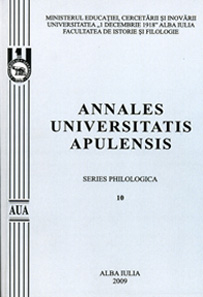,,PARTEA DE NEGOCIERE” A TEXTULUI ÎN MEMORIALISTICA DETENŢIEI
"Text Negociation" in the Memorialistic Works about Political Detention
Author(s): Lavinia GeambeiSubject(s): Literary Texts
Published by: Universitatea »1 Decembrie 1918« Alba Iulia
Keywords: pragmatics; memorialistic; detention; negotiation; function.
Summary/Abstract: This work starts from the premise that pragmatics is a discipline that often exceeds the strict framework of discourse, becoming a general theory of human action. Pragmatics is characterized by interdisciplinarity, presenting itself as a conglomerate of different domains, in constant interaction, studying language in context, since for both sociologists and logicians, pragmatic concerns cross all research related to meaning and communication. Pragmatic literary discourse has become a great challenge lately. The landscape of Romanian literature after 1990, lacking censorship, speaks about a literature of prisons, the existence of this chapter representing one of the most significant aspects of our contemporary literature and a particular experience in the history of Romanian literary creation. This literature includes poetry of detention, those lines created during reclusion, during some years of prison or forced labor camp, by those who have become poets behind bars (which is the name of five volumes of verses), and memorialistic prose of detention, many of those who survived ordeal and prison camps having the power to write about terrible testimonies, which horrified us. This literature exposes a monstrous historical lie. One possible approach in terms of pragmatics of memorialistic political detention under communism aims at the analysis of what might be called “text negotiation”. The author in general, the author of a memorialistic text of political detention in particular, often feels the need to justify himself. This part of text negotiation is usually found in the preface, forward and headers of various type. For this purpose, the author uses the most various strategies: self-depreciation formula, even “friendship offers” etc. Therefore, these parts of several memorialistic texts will be subject to investigation in this work. Pragmatically speaking, any work is a double violation of speech laws, primarily because it imposes its own statement and, secondly, because, directly or indirectly, it speaks only of its author, forcing the recipient to consider it on him. If in other texts, this problem is euphemized or disguised, it is visible in memorialistic and detention texts. Although most authors of detention memorialistic texts address to posterity, to awaken their conscience, to make them know the truth, to draw a warning, however, this could be just an illusion, and the text, in fact, claims its remedial function, being a painful way to recover the lost years. Also, the therapeutic function is inherent in these writings, because, by writing and testifying, former political prisoners gradually heal. Detention literature has a special status, a distinct feature, which can be regarded, as shown by Mihai Radulescu in his Istoria literaturii romane de detentie (History of Romanian detention literature), a species of didactic literature.
Journal: Annales Universitatis Apulensis. Series Philologica
- Issue Year: 11/2010
- Issue No: 1
- Page Range: 69-76
- Page Count: 8
- Language: Romanian

